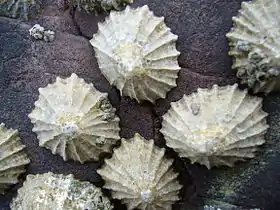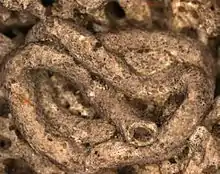Paleobiota of the Kristianstad Basin
The Kristianstad Basin is a Cretaceous-age structural basin and geological formation in northeastern Skåne, the southernmost province of Sweden. The sediments in the basin preserves a wide assortment of taxa represented in its fossil record, including the only non-avian dinosaur fossils in Sweden and one of the world's most diverse mosasaur faunas.
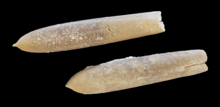


Though a majority of the taxa listed below lived during the latest early Campanian (c. 80.5 million years ago; fossils from the site Ivö Klack alone from this time compromise about 40 vertebrate species and more than 200 invertebrate species),[1] the Kristianstad Basin preserves fossils ranging in age from the early Santonian (c. 86.3 million years ago) to the early Maastrichtian (c. 72.1 million years ago); some of the animals in the list were not contemporaries, but separated from each other in time by several million years. The timespans from which fossils have been recovered is included for each species in the list.
Bony fish
Ray-finned fish
| Ray-finned fishes reported from the Kristianstad Basin | |||||||
|---|---|---|---|---|---|---|---|
| Genus | Species | Sites | Age | Material | Notes | Ref | Images |
| Anomoeodus | A. subclavatus | Ivö Klack, Ignaberga, Åsen | Latest Early Campanian – early Late Campanian | Dentitions and isolated teeth | A pycnodontid fish | [2] |
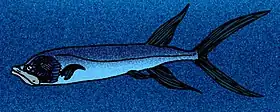 An ichthyodectid fish (Gillicus) |
| A. sp. | Balsvik, Ullstorp | Latest Early Campanian – early Late Campanian | Two isolated teeth | A pycnodontid fish | [3] | ||
| Enchodus | E. cf. gladiolus | Site not reported | Uncertain | A single isolated palatine tooth | An aulopiform fish | [4] | |
| E. sp. | Åsen | Latest Early Campanian | Dental remnants | An aulopiform fish, Enchodus-like dental remnants are abundant at Åsen and show considerable morphological variety. | [5] | ||
| cf. E. sp. | Balsvik | Uncertain | A single isolated palatine tooth | An aulopiform fish, morphology of this tooth is distinct from the tooth attributed to E. gladiolus. | [5] | ||
| Ichthyodectidae indet. | – | Åsen | Latest Early Campanian – early Late Campanian | Two isolated teeth and a single isolated scale | An ichthyodectid fish, similar to Gillicus. | [6] | |
| Lepisosteidae indet. | – | Åsen | Latest Early Campanian | A single isolated scale | A gar | [7] | |
| Pachyrhizodus | cf. P. sp. | Åsen | Latest Early Campanian – early Late Campanian | Four isolated teeth | An elopiform fish | [4] | |
| Protosphyraena | P. sp. | Ivö Klack, Åsen, Ullstorp | Earliest Campanian – latest Early Campanian | Six isolated teeth | A pachycormid fish. The teeth of Protosphyraena are much larger than those of the other fish in the basin and were once mistakenly referred to theropod dinosaurs. | [8][3] | |
| Pycnodontidae indet. | – | Åsen, Ullstorp | Latest Early Campanian | Two isolated teeth | A pycnodontid fish | [3] | |
| Teleostei indet. | – | Åsen | Latest Early Campanian | Two isolated teeth | A teleost fish, teeth similar to those attributed to Pachyrhizodus, but lack key diagnostic features. | [5] | |
Cartilaginous fish
Sharks
| Sharks reported from the Kristianstad Basin | |||||||
|---|---|---|---|---|---|---|---|
| Genus | Species | Sites | Age | Material | Notes | Ref | Images |
| Acanthoscyllium | A. sp. | Balsvik, Bjärlången, Ballingslöv | Late Campanian | Isolated teeth | A hemiscylliid shark | [9] |
|
| Anomotodon | A. hermani | Ivö Klack, Ugnsmunnarna, Ignaberga, Åsen, Balsvik | Latest Early Campanian – early Late Campanian | Isolated teeth | A mitsukurinid shark | [10][11] | |
| Archaeolamna | A. kopingensis | Ivö Klack, Ugnsmunnarna, Ignaberga, Åsen, Ballingslöv, Balsvik | Latest Early Campanian – earliest Maastrichtian | Isolated teeth | A lamniform shark | [10][12][9] | |
| Carcharias | C. aasenensis | Ugnsmunnarna, Ignaberga, Åsen | Latest Early Campanian | Isolated teeth | An odontaspidid lamniform shark, same genus as the modern sand tiger shark | [10] | |
| C. latus | Ivö Klack, Ugnsmunnarna, Ignaberga, Maltesholm, Åsen | Latest Early Campanian | Isolated teeth | An odontaspidid lamniform shark, same genus as the modern sand tiger shark | [10] | ||
| C. tenuis | Ivö Klack, Ugnsmunnarna, Ignaberga, Åsen | Latest Early Campanian | Isolated teeth | An odontaspidid lamniform shark, same genus as the modern sand tiger shark | [10] | ||
| C. sp. | Balsvik, Bjärlången, Ballingslöv | Late Campanian | Isolated teeth | An odontaspidid lamniform shark, same genus as the modern sand tiger shark | [13] | ||
| Cederstroemia | C. nilsi | Åsen | Latest Early Campanian | Isolated teeth | A wobbegong shark | [10] | |
| C. sp. | Ullstorp | Earliest Campanian | Isolated teeth | A wobbegong shark | [8] | ||
| Centroscymnus | C. schmidi | Balsvik | Late Campanian/Earliest Maastrichtian | A single tooth from the lower jaw | Centroscymnus in the Kristianstad Basin are from a younger (Maastrichtian) layer than the other sharks. The genus survives to the present day. | [9][14] | |
| Chiloscyllium | C. gaemersi | Ugnsmunnarna, Balsvik, Ballingslöv | Latest Early Campanian – Late Campanian | Isolated teeth | A hemiscylliid shark, the genus survives to the present day | [10][9] | |
| C. sp. | Ivö Klack, Ugnsmunnarna, Ignaberga, Maltesholm, Åsen | Latest Early Campanian | Isolated teeth | A hemiscylliid shark, the genus survives to the present day | [10] | ||
| Cretalamna | C. appendiculata | Ivö Klack, Ugnsmunnarna, Ignaberga, Maltesholm, Åsen | Latest Early Campanian | Isolated teeth | An otodontid lamniform shark | [10] | |
| C. borealis | Ugnsmunnarna, Ignaberga, Ivö Klack, Åsen, Hanaskog | Latest Early Campanian – early Late Campanian | Isolated teeth | An otodontid lamniform shark | [15] | ||
| C. sacroportheta | Ugnsmunnarna, Ignaberga, Ivö Klack, Åsen, Maltesholm | Latest Early Campanian | Isolated teeth | An otodontid lamniform shark | [16] | ||
| Cretodus | C. borodini | Ignaberga, Åsen | Latest Early Campanian | Isolated teeth | A cretoxyrhinid lamniform shark | [10] | |
| Cretorectolobus | C. sp. | Ignaberga, Åsen | Latest Early Campanian | Isolated teeth | A carpet shark | [10] | |
| Cretoxyrhina | C. mantelli | Ivö Klack, Ignaberga, Ullstorp, Balsvik | Earliest Campanian – early Late Campanian | Isolated teeth | A large cretoxyrhinid lamniform shark | [17][10] | |
| Eoetmopterus | E. supracretaceus | Balsvik | Late Campanian | Isolated teeth | A squaliform shark | [9] | |
| Galeorhinus | G. sp. | Ivö Klack, Ugnsmunnarna, Ignaberga | Latest Early Campanian | Isolated teeth | A triakid shark, same genus as the modern school shark | [10] | |
| Hemiscylliidae sp. | – | Ignaberga | Latest Early Campanian | Isolated teeth | A hemiscylliid shark | [10] | |
| Hemiscyllium | H. hermani | Ugnsmunnarna, Ignaberga, Åsen, Balsvik, Ballingslöv | Latest Early Campanian – Late Campanian | Isolated teeth | A hemiscylliid shark, the genus survives to the present day | [10][9] | |
| Heterodontus | H. aff. rugosus | Ignaberga, Maltesholm, Balsvik | Latest Early Campanian – early Late Campanian | Isolated teeth | A heterodontiform shark, same genus as the modern bullhead shark | [18] | |
| H. sp. 1 | Ivö Klack, Ugnsmunnarna, Ignaberga, Maltesholm, Åsen | Latest Early Campanian | Isolated teeth | A heterodontiform shark, same genus as the modern bullhead shark | [10] | ||
| H. sp. 2 | Ivö Klack, Ignaberga, Åsen | Latest Early Campanian | Isolated teeth | A heterodontiform shark, same genus as the modern bullhead shark | [10] | ||
| Hybodus | H. sp. | Ivö Klack, Ignaberga, Åsen | Latest Early Campanian | A fragmentary fin spine and isolated teeth | A hybodontiform shark | [10][19] | |
| Meristodon | M. sp. | Ullstorp | Earliest Campanian | Isolated teeth | A hybodontiform shark | [8] | |
| Palaeogaleus | P. sp. | Ugnsmunnarna, Åsen | Latest Early Campanian | Isolated teeth | A triakid shark | [10] | |
| Paranomotodon | P. sp. | Ivö Klack, Ugnsmunnarna, Ignaberga, Åsen | Latest Early Campanian | Isolated teeth | A lamniform shark | [10] | |
| Paraorthacodus | P. andersoni | Ivö Klack, Ignaberga, Åsen, Balsvik | Latest Early Campanian – early Late Campanian | Four isolated teeth | A paleospinacid shark | [10][20][11] | |
| P. conicus | Ivö Klack, Ugnsmunnarna, Ignaberga, Åsen, Balsvik | Latest Early Campanian – early Late Campanian | Over a thousand isolated teeth | A paleospinacid shark | [10][21][11] | ||
| P. n. sp. | Balsvik | Early Late Campanian | Isolated teeth | A paleospinacid shark | [11] | ||
| Pararhincodon | P. spp. | Ugnsmunnarna, Ignaberga, Maltesholm, Åsen, Balsvik, Bjärlången, Ballingslöv | Latest Early Campanian – Late Campanian | Isolated teeth | A parascylliid shark, probably several species | [10][9] | |
| Parasquatina | P. sp. | Balsvik | Late Campanian | Isolated teeth | A synechodontiform shark | [9] | |
| Paratriakis | P. sp. | Ivö Klack, Ugnsmunnarna, Ignaberga, Maltesholm, Åsen, Ballingslöv | Latest Early Campanian – Late Campanian | Isolated teeth | A triakid shark | [10][9] | |
| Polyacrodus | P. siversoni | Åsen | Latest Early Campanian | Isolated teeth | A hybodontiform shark | [10] | |
| P. sp. | Åsen, Ullstorp | Earliest Campanian – latest Early Campanian | Isolated teeth | A hybodontiform shark | [8][10] | ||
| Proetmopterus | P. hemmooriensis | Balsvik, Bjärlången, Ballingslöv | Late Campanian | Isolated teeth | A squaliform shark | [9] | |
| Pseudocorax | P. laevis | Ignaberga, Åsen, Balsvik | Latest Early Campanian – early Late Campanian | Isolated teeth | An anacoracid lamniform shark | [10][11] | |
| P. aff. affinis | Ballingslöv | Earliest Maastrichtian | A single isolated tooth | An anacoracid lamniform shark, in later (Maastrichtian) strata than the other sharks | [12] | ||
| Pseudoscapanorhynchus | P. sp. | Balsvik | Early Late Campanian | Isolated teeth | A mitsukurinid shark | [11] | |
| Ptychodus | P. spp. | Ignaberga | Late Middle Santonian – earliest Campanian | Isolated teeth | A hybodontiform shark, found in earlier strata than most other sharks | [8] | |
| Scapanorhynchus | S. perssoni | Ivö Klack, Ugnsmunnarna, Åsen | Latest Early Campanian | Isolated teeth | A mitsukurinid shark | [10] | |
| Scyliorhinidae sp. 1 | – | Åsen | Latest Early Campanian | Isolated teeth | A catshark | [10] | |
| Scyliorhinidae sp. 2 | – | Ivö Klack | Latest Early Campanian | Isolated teeth | A catshark | [10] | |
| Scyliorhinus | S. germanicus | Ivö Klack, Ugnsmunnarna, Ignaberga, Maltesholm, Åsen | Latest Early Campanian | Isolated teeth | A catshark, the genus survives to the present day | [10] | |
| S. moosi | Balsvik, Bjärslången, Ballingslöv | Late Campanian | Isolated teeth | A catshark, the genus survives to the present day | [13] | ||
| Serratolamna | S. sp. | Åsen | Latest Early Campanian | Isolated teeth | A cretoxyrhinid lamniform shark | [10] | |
| Squalicorax | S. kaupi | Ivö Klack, Ugnsmunnarna, Ignaberga, Maltesholm, Åsen | Latest Early Campanian | Isolated teeth | An anacoracid lamniform shark | [10] | |
| S. lindstromi | Ugnsmunnarna, Ignaberga, Ivö Klack, Åsen, Maltesholm, Hanaskog | Latest Early Campanian – early Late Campanian | Isolated teeth | An anacoracid lamniform shark | [15] | ||
| Squalidae spp. | – | Ivö Klack, Ugnsmunnarna, Ignaberga, Maltesholm, Åsen | Latest Early Campanian | Isolated teeth | A squalid shark, probably several species | [10] | |
| Squalus | S. ballingsloevensis | Ballingslöv, Bjärlången | Late Campanian – earliest Maastrichtian | More than a hundred isolated teeth | Squalus in the Kristianstad Basin are from a younger (Maastrichtian) layer than the other sharks. Same genus as modern spurdogs. The Ballingslöv site is not part of the Kristianstad Basin proper, representing a northwestern isolated outcrop. | [9][22][10] | |
| S. balsvikensis | Balsvik, Bjärlången, Ballingslöv | Late Campanian – earliest Maastrichtian | Several hundred isolated teeth | Squalus in the Kristianstad Basin are from a younger (Maastrichtian) layer than the other sharks. Same genus as modern spurdogs. | [9][22] | ||
| Squatina | S. fortemordeo | Åsen | Latest Early Campanian | Isolated teeth | An angelshark, the genus survives to the present day | [23] | |
| S. lundegreni | Åsen | Latest Early Campanian | Isolated teeth | An angelshark, the genus survives to the present day | [23] | ||
| S. sp. | Ullstorp, Maltesholm, Bjärlången, Ballingslöv | Earliest Campanian – Late Campanian | Isolated teeth | An angelshark, the genus survives to the present day | [24] | ||
| Squatirhina | S. sp. | Ivö Klack, Ugnsmunnarna, Ignaberga, Maltesholm, Åsen | Latest Early Campanian | Isolated teeth | A wobbegong shark | [10] | |
| Synechodus | S. lerichei | Ugnsmunnarna, Ignaberga | Latest Early Campanian | Isolated teeth | A paleospinacid shark | [25] | |
| S. filipi | Ugnsmunnarna, Ignaberga, Åsen | Latest Early Campanian | Isolated teeth | A paleospinacid shark | [16] | ||
| S. perssoni | Ugnsmunnarna, Ignaberga | Latest Early Campanian | Isolated teeth | A paleospinacid shark | [26] | ||
| S. sp. 1 | Ivö Klack, Ugnsmunnarna, Ignaberga, Åsen, Balsvik | Latest Early Campanian – Late Campanian | Isolated teeth | A paleospinacid shark | [10][9] | ||
| S. sp. 2 | Ivö Klack, Ugnsmunnarna, Ignaberga, Maltesholm, Åsen, Balsvik | Latest Early Campanian – Late Campanian | Isolated teeth | A paleospinacid shark | [10][9] | ||
Holocephali
| Holocephali reported from the Kristianstad Basin | |||||||
|---|---|---|---|---|---|---|---|
| Genus | Species | Sites | Age | Material | Notes | Ref | Images |
| Amylodon | A. sp. | Åsen | Latest Early Campanian | Dental remnants | A chimaeriform fish | [27] |
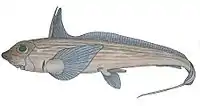 A chimaeriform fish (Chimaera, a relative of the four genera discovered in the Kristianstad Basin) |
| Edaphodon | E. sp. | Åsen | Latest Early Campanian | Dental remnants | A chimaeriform fish | [27] | |
| Elasmodus | E. sp. | Åsen, Hanaskog | Latest Early Campanian – early Late Campanian | Dental remnants and a mandibular plate | A chimaeriform fish | [28] | |
| Ischyodus | I. bifurcatus | Åsen | Latest Early Campanian | Dental remnants | A chimaeriform fish | [27] | |
Rays
| Rays reported from the Kristianstad Basin | |||||||
|---|---|---|---|---|---|---|---|
| Genus | Species | Sites | Age | Material | Notes | Ref | Images |
| Raja | R. sp. | Balsvik, Bjärlången, Ballingslöv | Earliest Maastrichtian | Isolated teeth | A rajiform ray. Raja in the Kristianstad Basin are from younger (Maastrichtian) strata than the other rays. The genus survives to the present day. | [12] |
|
| Rhinobatidae sp. | – | Balsvik, Bjärlången, Ballingslöv | Earliest Maastrichtian | Isolated teeth | A rhinobatid ray, Maastrichtian Rhinobatid ray fossils outnumber those of Raja at Bjärlången and Ballingslöv but are less common at Balsvik. | [12] | |
| Rhinobatoidea sp. 1 | – | Ignaberga | Latest Early Campanian | Isolated teeth | A rhinobatoid ray | [10] | |
| Rhinobatoidea sp. 2 | – | Ugnsmunnarna, Åsen | Latest Early Campanian | Isolated teeth | A rhinobatoid ray | [10] | |
| Rhinobatos | R. casieri | Åsen | Latest Early Campanian | Isolated teeth | A rhinobatid ray, the genus survives to the present day | [10] | |
| R. sp. 1 | Åsen | Latest Early Campanian | Isolated teeth | A rhinobatid ray, the genus survives to the present day | [10] | ||
| R. sp. 2 | Åsen | Latest Early Campanian | Isolated teeth | A rhinobatid ray, the genus survives to the present day | [10] | ||
| R. sp. 3 | Ivö Klack, Ignaberga, Åsen | Latest Early Campanian | Isolated teeth | A rhinobatid ray, the genus survives to the present day | [10] | ||
| Sclerorhynchidae indet. | – | Ullstorp | Earliest Campanian | Isolated teeth | A sclerorhynchid ray, fossils as of yet unpublished | [8] | |
| Walteraja | W. exigua | Balsvik | Late Campanian | Isolated teeth | A rajiform ray | [9] | |
Crocodylomorphs
In addition to the remains referred to Aigialosuchus, detached and unidentified crocodylomorph scutes have also been discovered in Campanian-age deposits at Ivö Klack.[29]
| Crocodylomorphs reported from the Kristianstad Basin | |||||||
|---|---|---|---|---|---|---|---|
| Genus | Species | Sites | Age | Material | Notes | Ref | Images |
| Aigialosuchus | A. villandensis | Ivö Klack, Ullstorp | Earliest Campanian – latest Early Campanian | Anterior parts of the skull and partial mandible | A marine dyrosaurid crocodylomorph and the only crocodylomorph known from the Kristianstad Basin. Likely durophagous (eating hard-shelled organisms). Its skull was similar to that of modern gharials. | [8][30][31] |  Dyrosaurus, a relative of Aigialosuchus |
Dinosaurs
Non-avian dinosaurs
| Non-avian dinosaurs reported from the Kristianstad Basin | ||||||
|---|---|---|---|---|---|---|
| Group | Sites | Age | Material | Notes | Ref | Images |
| Leptoceratopsidae indet. | Åsen, Ullstorp | Earliest Campanian – latest Early Campanian | Four maxillary teeth, a dentary tooth, two caudal vertebrae, one right manual phalanx | Morphology of the teeth recovered corresponds roughly to Leptoceratops. Given that the teeth lack some of the ridges present in the teeth of Leptoceratops, and because of geographical distance, the Åsen leptoceratopsid is likely a new taxon. | [32][33] |
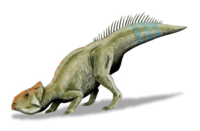 A leptoceratopsid dinosaur (Leptoceratops) 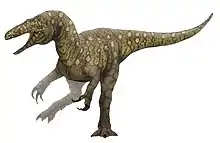 A theropod dinosaur (Australovenator) |
| Ornithopoda indet. 1 | Åsen | Latest Early Campanian | A left pedal phalanx | A small ornithopod dinosaur. The recovered phalanx resembles the same bone in Thescelosaurus assiniboiensis. | [34] | |
| Ornithopoda indet. 2 | Åsen | Latest Early Campanian | A left pedal phalanx | A small ornithopod dinosaur. The recovered phalanx resembles the same bone in Hypsilophodon foxii. | [35] | |
| Theropoda indet. | Ugnsmunnarna | Latest Early Campanian | An incomplete right tibia | Identified as the remains of a small theropod dinosaur after comparisons with the same bone in the Australian genus Australovenator. The bone structure confidently identifies the fossil as that of a non-avian theropod dinosaur. | [36][37] | |
Birds
In addition to the fossils described below, indeterminate hesperornithiform remains have also been recovered from Åsen.[38]
| Birds reported from the Kristianstad Basin | |||||||
|---|---|---|---|---|---|---|---|
| Genus | Species | Sites | Age | Material | Notes | Ref | Images |
| Baptornis | B. sp. | Ivö Klack | Latest Early Campanian | A dorsal vertebra and a tarsometatarsus | A hesperornithiform bird, specimens previously referred to "Parascaniornis stensioi" | [39] |
|
| Hesperornis | H. rossicus | Ivö Klack | Latest Early Campanian | Two tarsometatarsi | A hesperornithiform bird | [40] | |
| H. sp. | Ivö Klack | Latest Early Campanian | A dorsal vertebra | A hesperornithiform bird, the vertebra recovered is less slender than the one in H. rossicus | [41] | ||
Mosasaurs
| Mosasaurs reported from the Kristianstad Basin | |||||||
|---|---|---|---|---|---|---|---|
| Genus | Species | Sites | Age | Material | Notes | Ref | Images |
| Clidastes | C. propython | Ivö Klack, Ugnsmunnarna, Ignaberga, Åsen, Axeltorp | Latest Early Campanian – early Late Campanian | Isolated (probably shed) tooth crowns, vertebrae | Most of the Clidastes fossils in the Kristianstad Basin are probably from juveniles measuring about 2–3 meters in length, with a few adult invidivuals at probably around 6 meters. | [10][42][43][11] |
|
| Eonatator | E. sternbergi | Ivö Klack, Ignaberga, Åsen | Latest Early Campanian – early Late Campanian | Isolated (probably shed) teeth, marginal tooth crowns, vertebrae, a premaxilla and a pterygoid | Eonatator teeth are relatively common in the Kristianstad Basin, indicating that there were a relatively large number of individuals present. | [10][44][11] | |
| Hainosaurus | H. sp. | Ivö Klack, Ugnsmunnarna, Maltesholm, Åsen | Latest Early Campanian | Isolated marginal teeth | A large tylosaurine mosasaur. Hainosaurus is frequently treated as synonymous with Tylosaurus. | [10][44] | |
| Mosasaurus | M. aff. lemonnieri | Åhus | Latest Campanian/earliest Maastrichtian | A single isolated tooth crown (probably shed) | Known from a single tooth, Mosasaurus in the Kristianstad Basin is from a younger (Late Campanian/Maastrichtian) layer than the other mosasaurs. Similar in body size (and likely ecological niche) to the earlier Tylosaurus ivoensis. | [45][46] | |
| Platecarpus | P. sp. | Ivö Klack, Åsen, Ullstorp | Earliest Campanian – latest Early Campanian | Several detached tooth crowns, fragments of a jawbone | Previously referred to Platecarpus somenensis. The material referred to Platecarpus might be non-diagnostic. | [8][10][44][47] | |
| Plioplatecarpus | P. cf. primaevus | Balsvik | Late Campanian/earliest Maastrichtian | A partial right quadrate | The overall morphology of the quadrate bone is consistent with Plioplatecarpus and in particular with P. primaevus, a species otherwise only found in North America. The quadrate is from a younger (Maastrichtian) layer than the other mosasaurs. | [9][48] | |
| Prognathodon | P. sp. | Ivö Klack, Åsen | Latest Early Campanian | Isolated teeth, fragments of a jawbone, vertebrae | A mosasaur at about 8 meters in length with relatively wide and deep jaws. Bite marks matching Prognathodon teeth have been found on plesiosaur bones in the Kristianstad Basin. Frequently treated and listed under the name "Dollosaurus" or "Prognathodon (Dollosaurus)"; Dollosaurus being a junior synonym of Prognathodon. | [10][42][49] | |
| Tylosaurus | T. ivoensis | Ivö Klack, Ugnsmunnarna, Ignaberga, Åsen, Axeltorp, Balsberg | Latest Early Campanian – early Late Campanian | Several marginal teeth, pterygoid teeth, partial jawbones and several vertebrae | Previously referred to Mosasaurus and Hainosaurus. The largest mosasaur in the basin and "undoubtedly" its top predator, the lower jaw of Tylosaurus ivoensis is estimated to have been over 1.5 meters in length. | [50][10][44][51][11] | |
Plesiosaurs
The last comprehensive review of the plesiosaur fauna in the Kristianstad Basin was done by paleontologist Per-Ove Persson in the 1960s and his taxonomy is still used with caution, pending a much-needed new review.[38]
| Plesiosaurs reported from the Kristianstad Basin | |||||||
|---|---|---|---|---|---|---|---|
| Genus | Species | Sites | Age | Material | Notes | Ref | Images |
| Elasmosaurus? | E. cf. gigas | Ignaberga | Latest Early Campanian | A single vertebral centrum from the thoracic-lumbar region | A large elasmosaurid plesiosaur, the centrum is very poorly preserved | [10][52] |
 A polycotylid plesiosaur (Trinacromerum) |
| E. cf. helmersenii | Ivö Klack | Latest Early Campanian | A single vertebral centrum from the cervical region | A large elasmosaurid plesiosaur, the centrum is very well preserved | [10][53] | ||
| Polycotylidae indet. | – | Ivö Klack | Latest Early Campanian | Four incomplete vertebrae | Poorly preserved fossils, might be the same taxon as the other polycotylid | [10][42][54] | |
| Polycotylidae? indet. | – | Ivö Klack | Latest Early Campanian | Twelve detached teeth | Poorly preserved fossils, might be the same taxon as the other polycotylid | [10][55] | |
| Scanisaurus | S. cf. nazarowi | Ivö Klack, Ignaberga, Maltesholm, Axeltorp, Kjuge | Latest Early Campanian | Vertebral centra, detached teeth, diaphysical ossifications of humeri and femora | The most common plesiosaur in the Kristianstad Basin. Scanisaurus is no longer considered a valid taxon, but the name continues to be used for practical purposes. S. nazarowi is the type species of Scanisaurus and was previously referred to Cimoliasaurus. | [10][56][57] | |
| S. sp. | Ignaberga, Åsen | Latest Early Campanian – early Late Campanian | A crushed skull, isolated teeth | Fossils of this species include the only plesiosaurian skull (albeit crushed) known from Sweden. The preserved teeth are similar to those referred to Scanisaurus cf. nazarowi. | [10][11][58] | ||
Pterosaurs
Possible pterosaur bone fragments have been recovered from earliest Campanian-age deposits at Ullstorp, though they remain unpublished.[8]
Scincomorpha
Fossils of terrestrial scincomorph lizards have been recovered in the Kristianstad Basin, but are as of yet unpublished.[59]
Turtles
In addition to the fossils described below, indeterminate turtle remains, including limb bones and carapace fragments, have also been recovered from Ivö Klack, Ugnsmunnarna, Ignaberga and Åsen.[10][60]
| Turtles reported from the Kristianstad Basin | |||||||
|---|---|---|---|---|---|---|---|
| Genus | Species | Sites | Age | Material | Notes | Ref | Images |
| Osteopygis | O?. sp. | Maltesholm | Latest Early Campanian | An incomplete carapace | A macrobaenid turtle; Einarsson (2018) notes that the idenfitication as Osteopygis is likely incorrect and that the material is more likely to belong to the genus Euclastes, though it has not formally been reclassified. | [10][61][62] |
|
| Trionychidae indet. | – | Ivö Klack | Latest Early Campanian | Shell fragments | A softshell turtle | [10] | |
Invertebrates
- Note: Although the Kristianstad Basin is incredibly rich in invertebrate fossils and diversity, with hundreds of species, the creation of a full list is impossible due to a lack of published overviews and recent examinations.[63] Which lists are incomplete is specified below and estimates in regards to how many species are actually present are included if possible.
Bivalves
The bivalves are the most species-rich group present in the Kristianstad Basin, with Surlyk & Sørenson (2010) stating that close to 70 distinct species were present at Ivö Klack alone.[64]
| Bivalves reported from the Kristianstad Basin | |||||||
|---|---|---|---|---|---|---|---|
| Genus | Species | Sites | Age | Material | Notes | Ref | Images |
| Acutostrea | A. incurva | Åsen, Axeltorp | Latest Early Campanian | Several specimens | A true oyster | [65][66] |
|
| Arcostrea | A. diluviana | Ivö Klack | Latest Early Campanian | Several specimens | A true oyster | [67] | |
| Barbartia | B. sp. | Ullstorp | Latest Early Campanian | Several specimens | A arcid, the genus survives to the present day | [68] | |
| Chlamys | C. sp. | Ullstorp | Latest Early Campanian | Several specimens | A pectinid, the genus survives to the present day | [68] | |
| Hyotissa | H. sp. | Ivö Klack | Several specimens | An ostreid, the genus survives to the present day | [66] | ||
| Inoceramus | I. sp. | Ullstorp | Latest Early Campanian | Several specimens | A pteriid | [68] | |
| Lima | L. semisulcata | Balsvik | Early Late Campanian | Several specimens | A limid, the genus survives to the present day | [9] | |
| Mimachlamys | M. sp. | Ullstorp | Latest Early Campanian | Several specimens | A pectinid, the genus survives to the present day | [68] | |
| Nemocardium | N. sp. | Ullstorp | Latest Early Campanian | Several specimens | A carditid, the genus survives to the present day | [68] | |
| Nucula | N. sp. | Ullstorp | Latest Early Campanian | Several specimens | A nuculid, the genus survives to the present day | [68] | |
| Ostrea | O. haliotoidea | Ivö Klack, Hanaskog | Latest Early Campanian – Early Late Campanian | Several specimens | A true oyster | [69] | |
| O. semiplana | Hanaskog | Early Late Campanian | Several specimens | A true oyster | [11] | ||
| Ostreidae indet. | – | Åsen | Latest Early Campanian | Several specimens | A true oyster | [70] | |
| Pecten | P. subaraturs | Balsvik | Early Late Campanian | Several specimens | A pectinid, the genus survives to the present day | [9] | |
| P. undulatus | Hanaskog | Early Late Campanian | Several specimens | A pectinid, the genus survives to the present day | [11] | ||
| Pycnodonte | P. vesicularis | Hanaskog, Balsvik, Ballingslöv | Early Late Campanian – Latest Late Campanian | Several specimens | An ostreid | [71] | |
| Rastellum | R. diluvianum | Ivö Klack | Several specimens | A true oyster | [66] | ||
| Rudista indet. | – | Ullstorp | Latest Early Campanian | Several specimens | A rudist | [68] | |
| Spondylus | S. labiatus | Ivö Klack | Latest Early Campanian | Several specimens | A spondylid, the genus survives to the present day | [67] | |
Brachiopods
According to Surlyk & Sørenson (2010) there were 27 distinct species of brachiopods present at Ivö Klack alone.[64]
| Brachiopods reported from the Kristianstad Basin | |||||||
|---|---|---|---|---|---|---|---|
| Genus | Species | Sites | Age | Material | Notes | Ref | Images |
| Ancistrocrania | A. stobei | Ivö Klack | Latest Early Campanian | Several specimens | A craniid | [67] |
|
| Crania | C. craniolaris | Ivö Klack, Balsberg, Ugnsmunnarna | Latest Early Campanian | Several specimens | A craniid; one of the dominant brachiopod genera in the basin | [72][73] | |
| Cyranoia | C. longirostris | Ivö Klack | Latest Early Campanian | Several specimens | A terebratulidan | [74] | |
| C. vissae | Ivö Klack | Latest Early Campanian | Several specimens | A terebratulidan | [74] | ||
| Isocrania | I. egnabergensis | Ugnsmunnarna, Ignaberga | Latest Early Campanian | Several specimens | A craniid | [72] | |
| Magas | Balsberg | Several specimens | A terebratulidan; one of the dominant brachiopod genera in the basin | [66][73] | |||
| Rhynchonella | R. spectabilis | Ullstorp | Latest Early Campanian | Several specimens | A rhynchonellid; one of the dominant brachiopod genera in the basin | [68][73] | |
| Terebratula | Ivö Klack, Ignaberga | Latest Early Campanian | Several specimens | A terebratulidan; one of the dominant brachiopod genera in the basin | [66][75][73] | ||
Belemnites
| Belemnites reported from the Kristianstad Basin | |||||||
|---|---|---|---|---|---|---|---|
| Genus | Species | Sites | Age | Material | Notes | Ref | Images |
| Actinocamax | A. verus | Ringeleslätt, Ullstorp | Earliest Campanian | Belemnite cones | [77][78] |
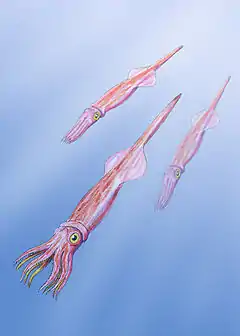 Life restoration of a group of belemnites | |
| Belemnellocamax | B. balsvikensis | Åsen, Balsvik | Earliest Late Campanian | Belemnite cones | [77][79] | ||
| B. grossouvrei | Ullstorp | Earliest Campanian | Belemnite cones | [77][78] | |||
| B. mammillatus | Ullstorp, Ugnsmunnarna, Ignaberga, Ivö Klack, Åsen, Maltesholm | Latest Early Campanian | Belemnite cones | [77][80] | |||
| Belemnella | B. lanceolata | Balsvik, Bjärlången, Ballingslöv | Latest Campanian/earliest Maastrichtian | Belemnite cones | [77][81] | ||
| Belemnitella | B. alpha | Ringeleslätt, Ullstorp | Earliest Campanian | Belemnite cones | [77][82] | ||
| B. minor | Balsvik, Bjärlången | Latest Campanian/earliest Maastrichtian | Belemnite cones | [77] | |||
| B. mucronata | Ullstorp, Ugnsmunnarna, Ignaberga, Ivö Klack, Åsen, Maltesholm, Balsvik, Hanaskog, Bjärlången | Latest Early Campanian – Middle Late Campanian | Belemnite cones | [77][78][81][83] | |||
| B. praecursor | Ullstorp | Earliest Campanian | Belemnite cones | Possibly misidentified specimens of B. alpha | [77] | ||
| B. sp. | Ballingslöv | Latest Campanian/earliest Maastrichtian | Belemnite cones | [77] | |||
| Gonioteuthis | G. granulaquadrata | Ringeleslätt, Ignaberga, Ullstorp | Earliest Campanian | Belemnite cones | [77][80] | ||
| G. granulata | Ringeleslätt | Late Santonian | Belemnite cones | [77][82] | |||
| G. quadrata quadrata | Ullstorp | Earliest Campanian | Belemnite cones | [77] | |||
| G. quadrata scaniensis | Ugnsmunnarna, Ignaberga, Ivö Klack, Åsen | Latest Early Campanian | Belemnite cones | [77][78] | |||
| G. westfalica westfalica | Ringeleslätt | Early/Middle Santonian | Belemnite cones | [77][82] | |||
| G. westfalicagranulata | Ringeleslätt, Ignaberga | Late Middle Santonian | Belemnite cones | [77][82] | |||
Ammonites
According to Surlyk & Sørenson, a large species of ammonite is also known from Ivö Klack.[64]
| Ammonites reported from the Kristianstad Basin | |||||||
|---|---|---|---|---|---|---|---|
| Genus | Species | Sites | Age | Material | Notes | Ref | Images |
| Ammonites | A. stobei | Ignaberga | Latest Early Campanian | Shell fossils | [75] |
| |
| Baculites | B. sp. | Ullstorp | Earliest Campanian | Shell fossils | A turrilitoid | [8] | |
| Hauericeras | H. cf. pseudogardeni | Ignaberga | Latest Early Campanian | Shell fossils | A desmoceratoid | [84] | |
Chitons
| Chitons reported from the Kristianstad Basin | |||||||
|---|---|---|---|---|---|---|---|
| Genus | Species | Sites | Age | Material | Notes | Ref | Images |
| Olingechiton | O. triangulatus | Barnakälla | Campanian | A paleoloricatan | [85] | ||
| Scanochiton | S. jugatus | Barnakälla | Campanian | A paleoloricatan | [85] | ||
Corals
Fossils of corals are common in several sites throughout the Kristianstad Basin.[76] The list below only accounts for the recently revised diversity of corals found at Ivö Klack.[86]
| Corals reported from the Kristianstad Basin | |||||||
|---|---|---|---|---|---|---|---|
| Genus | Species | Sites | Age | Material | Notes | Ref | Images |
| Acrosmilia | A. baltica | Ivö Klack | Latest Early Campanian | Several specimens | A acrosmiliid | [86] |
|
| Clausastrea | C. informal sp. A | Ivö Klack | Latest Early Campanian | Several specimens | A montlivaltiid | [86] | |
| C. informal sp. B | Ivö Klack | Latest Early Campanian | Several specimens | A montlivaltiid | [86] | ||
| Dimorphastrea | D. sp. | Ivö Klack | Latest Early Campanian | Several specimens | A latomeandrid | [86] | |
| D?. sp. | Ivö Klack | Latest Early Campanian | Several specimens | A latomeandrid | [86] | ||
| Diploria | D. sp. | Ivö Klack | Latest Early Campanian | Several specimens | A mussid, the genus survives to the present day | [86] | |
| Echinophyllia | E. sp. | Ivö Klack | Latest Early Campanian | Several specimens | A lobophylliid, the genus survives to the present day | [86] | |
| Micrabacia | M. hilgardi | Åsen | Latest Early Campanian | Several specimens | A micrabaciid | [67] | |
| M. suecica | Ivö Klack | Latest Early Campanian | Several specimens | A micrabaciid | [86] | ||
| Paracyathus | P. sp. | Ivö Klack | Latest Early Campanian | Several specimens | A caryophylliid, the genus survives to the present day | [86] | |
| Parasmilia | P. centralis | Ivö Klack | Latest Early Campanian | Several specimens | A caryophylliid, the genus survives to the present day | [86] | |
| Scleractinia informal indet. A | – | Ivö Klack | Latest Early Campanian | Several specimens | [86] | ||
| Scleractinia informal indet. B | – | Ivö Klack | Latest Early Campanian | Several specimens | [86] | ||
Crinoids
Fossils of crinoids have been found at several sites throughout the Kristianstad Basin.[67]
Crustaceans
| Crustaceans reported from the Kristianstad Basin | |||||||
|---|---|---|---|---|---|---|---|
| Genus | Species | Sites | Age | Material | Notes | Ref | Images |
| Arcoscalpellum | A. sp. | Åsen | Latest Early Campanian | Several specimens | A goose barnacle | [67] |
|
| Callianassa | C. sp. | Åsen | Latest Early Campanian | Chelipeds (legs bearing claws) | A decapod crustacean, the genus survives to the present day | [87] | |
| Protocallianassa | P. faujasi | Åsen, Ivö Klack | Latest Early Campanian – earliest Late Campanian | Several chelipeds (legs bearing claws) | A decapod crustacean, sometimes referred to as the "burrowing ghost shrimp" | [88][89] | |
| Pycnolepas | P. ignabergensis | Ignaberga | Latest Early Campanian | A brachylepadomorph barnacle | [90] | ||
Echinoids
According to Surlyk & Sørenson (2010) there were 18 distinct species of echinoids present at Ivö Klack alone.[64]
| Echinoids reported from the Kristianstad Basin | |||||||
|---|---|---|---|---|---|---|---|
| Genus | Species | Sites | Age | Material | Notes | Ref | Images |
| Cidaris | C. sp. | Ullstorp, Ignaberga | Latest Early Campanian | Several specimens | A cidaroid, the genus survives to the present day; one of the dominant echinoid genera in the basin | [68][75][91] | |
| Conulus | C. sp. | Balsvik | Late Campanian | Several specimens | A echinoneoid | [92] | |
| Diplodetus | D. idae | Köpinge, Bäckaskog | Latest Early Campanian – earliest Late Campanian | Several specimens | A spatangoid; many fossils mislabelled as various species of the related genus Micraster | [66][93] | |
| Echinocorys | E. sp. | Throughout the basin | Campanian | Several specimens | A holasteroid; one of the dominant echinoid genera in the basin | [66][91] | |
| Echinogalerus | E. peltiformis | Ivö Klack | Latest Early Campanian – earliest Late Campanian | Several specimens | A cassiduloid; sometimes referred to by the invalid name Caratomus; one of the dominant echinoid genera in the basin | [92][91][94] | |
| Hemipneustes | H. sp. | Ignaberga | Latest Early Campanian | Several specimens | A holasteroid | [75][92] | |
| Holaster | H. sp. | Åsen | Early Campanian | Several specimens | A holasteroid; one of the dominant echinoid genera in the basin | [92][91] | |
| Micraster | M. sp. | Balsvik | Late Campanian | Several specimens | A spatangoid; one of the dominant echinoid genera in the basin | [92][91] | |
| Pedinopsis | P. sp. | Ivö Klack | Early Campanian | Several specimens | An indeterminate echinacean | [92] | |
| Phymosoma | P. sp. | Ivö Klack | Early Campanian | Several specimens | A phymosomatoid; one of the dominant echinoid genera in the basin | [92][91] | |
| Phymosomatoida indet. | – | Ignaberga | Early Campanian | Shells | A phymosomatoid | [92] | |
| Phymotaxis | P. sp. | Ivö Klack | Early Campanian | Several specimens | A stomopneustoid | [92] | |
| Plagiochasma | P.? sp. | Ivö Klack, Ignaberga | Early Campanian | Several specimens | A irregularian | [92] | |
| Polysalenia | P. notabilis | Ivö Klack | Latest Early Campanian | A few specimens | A salenioid | [67][95] | |
| P. cottaldi | Ivö Klack | Latest Early Campanian | A single spcimen | A salenioid | [96] | ||
| Salenia | S. areolata | Ignaberga, Barnakälla, Balsberg, Ivö Klack | Latest Early Campanian | Several specimens | A salenioid; relatively common species, one of the dominant echinoid genera in the basin | [75][97][91] | |
| S. lundgreni | Mörby | Early Late Campanian | A few specimens | A salenioid; one of the dominant echinoid genera in the basin | [98][91] | ||
| Stereocidaris | S. hudspethensis | Ivö Klack | Early Campanian | Several specimens | A cidaroid, the genus survives to the present day | [92] | |
| S. sp. | Ivö Klack | Early Campanian | Several specimens | A cidaroid, the genus survives to the present day | [92] | ||
| Trisalenia | T. loveni | Ivö Klack, Barnakälla, Ignaberga | Latest Early Campanian | Several specimens | A salenioid; a large number of specimens found at Ivö Klack, with few from Barnakälla and Ignaberga | [66][67][99][92] | |
| Trochalosoma | T.? corneti | Ivö Klack | Early Campanian | Several specimens | A phymosomatoid | [92] | |
| Tylocidaris | T. gosae | Ivö Klack | Early Campanian | Several specimens | A cidaroid | [92] | |
| T. squamifera | Ignaberga | Campanian | Several specimens | A cidaroid | [100] | ||
Gastropods
According to Surlyk & Sørenson (2010), 19 species of gastropods could be identified from fossils just from the latest Early Campanian of Ivö Klack.[64] Their subsequent 2011 study on the gastropods of the site only listed the 15 species accounted for below.[101]
| Gastropods reported from the Kristianstad Basin | |||||||
|---|---|---|---|---|---|---|---|
| Genus | Species | Sites | Age | Material | Notes | Ref | Images |
| Campanile | C. sp. | Ivö Klack, Åsen | Latest Early Campanian | Several specimens | A marine caenogastropod | [101][68] |
|
| Campanilidae sp. A | – | Ivö Klack | Latest Early Campanian | Three specimens | A marine caenogastropod | [101] | |
| Campanilidae sp. B | – | Ivö Klack | Latest Early Campanian | Three specimens | A marine caenogastropod | [101] | |
| Gastropoda indet. 1 | – | Ivö Klack | Latest Early Campanian | Not specified | A hitherto unidentified marine gastropod | [101] | |
| Gastropoda indet. 2 | – | Ivö Klack | Latest Early Campanian | Not specified | A hitherto unidentified marine gastropod | [101] | |
| Gastropoda indet. 3 | – | Ivö Klack | Latest Early Campanian | Not specified | A hitherto unidentified marine gastropod | [101] | |
| Gyrodes | G. sp. | Ivö Klack | Latest Early Campanian | One specimen | A marine caenogastropod | [101] | |
| Naticidae sp. | – | Ivö Klack | Latest Early Campanian | One specimen | A marine caenogastropod | [101] | |
| Neomesogastropoda aff. Naticidae sp. | – | Ivö Klack | Latest Early Campanian | Eight specimens | A marine caenogastropod | [101] | |
| Otostoma | O. sp. A | Ivö Klack | Latest Early Campanian | One specimen | A marine neritimorph | [101] | |
| O. sp. B | Ivö Klack | Latest Early Campanian | One specimen | A marine neritimorph | [101] | ||
| O. sp. C | Ivö Klack | Latest Early Campanian | One specimen | A marine neritimorph | [101] | ||
| Patella | P. sp. | Ivö Klack | Latest Early Campanian | Two specimens | A marine patellogastropod, the genus survives to the present day | [101] | |
| Trochidae sp. aff. Chilodonta | – | Ivö Klack | Latest Early Campanian | One specimen | A marine archaeogastropod | [101] | |
| Trochidae sp. | – | Ivö Klack | Latest Early Campanian | One specimen | A marine archaeogastropod | [101] | |
| Volutodermidae sp. A | – | Ivö Klack | Latest Early Campanian | Two specimens | A marine caenogastropod | [101] | |
| Volutodermidae sp. B | – | Ivö Klack | Latest Early Campanian | One specimen | A marine caenogastropod | [101] | |
Polychaetes
In addition to the diverse polychaete worm fauna of Ivö Klack listed below, encrusters of serpulid polychaetes have also been discovered at Åsen,[11] though they are considerably fewer in number there and as of yet unpublished.[102]
| Polychaetes reported from the Kristianstad Basin | |||||||
|---|---|---|---|---|---|---|---|
| Genus | Species | Sites | Age | Material | Notes | Ref | Images |
| Cementula | C. sphaerica | Ivö Klack | Latest Early Campanian | Trace fossils; polychaete encrusters in rock | A serpulid; abundant and small species | [103] |
|
| Filogranula | F. cincta | Ivö Klack | Latest Early Campanian | Trace fossils; polychaete encrusters in rock | A serpulid; rare and medium-sized species, the genus survives to the present day | [103] | |
| Glomerula | G. plexus | Ivö Klack | Latest Early Campanian | Trace fossils; polychaete encrusters in rock | A sabellid; rare and medium-sized species, the genus survives to the present day | [103] | |
| G. serpentina | Ivö Klack | Latest Early Campanian | Trace fossils; polychaete encrusters in rock | A sabellid; abundant and small species, the genus survives to the present day | [103] | ||
| Gynaeconitis | G. gynaeconitis | Ivö Klack | Latest Early Campanian | Trace fossils; polychaete encrusters in rock | A serpulid; common and large species | [103] | |
| G.? sp. | Ivö Klack | Latest Early Campanian | Trace fossils; polychaete encrusters in rock | A serpulid; rare and large species | [103] | ||
| Neovermilia | N. cf. ampullacea | Ivö Klack | Latest Early Campanian | Trace fossils; polychaete encrusters in rock | A serpulid; rare and medium-sized species, the genus survives to the present day | [103] | |
| N.? sp. A | Ivö Klack | Latest Early Campanian | Trace fossils; polychaete encrusters in rock | A serpulid; rare and small species, the genus survives to the present day | [103] | ||
| N.? sp. B | Ivö Klack | Latest Early Campanian | Trace fossils; polychaete encrusters in rock | A serpulid; rare and large species, the genus survives to the present day | [103] | ||
| Placostegus | P. aduncus | Ivö Klack | Latest Early Campanian | Trace fossils; polychaete encrusters in rock | A serpulid; rare and medium-sized species, the genus survives to the present day | [103] | |
| Pileolaria | P. sp. A | Ivö Klack | Latest Early Campanian | Trace fossils; polychaete encrusters in rock | A serpulid; abundant and small species, the genus survives to the present day | [103] | |
| P. sp. B | Ivö Klack | Latest Early Campanian | Trace fossils; polychaete encrusters in rock | A serpulid; common and small species, the genus survives to the present day | [103] | ||
| Protectoconorca | cf. P. senonensis | Ivö Klack | Latest Early Campanian | Trace fossils; polychaete encrusters in rock | A serpulid; rare and large species | [103] | |
| Pyrgopolon | P. (Septenaria) sp. aff. voigti | Ivö Klack | Latest Early Campanian | Trace fossils; polychaete encrusters in rock | A serpulid; common and medium-sized species, the genus survives to the present day | [103] | |
| P. sp. | Ivö Klack | Latest Early Campanian | Trace fossils; polychaete encrusters in rock | A serpulid; rare and medium-sized species, the genus survives to the present day | [103] | ||
| P.? sp. | Ivö Klack | Latest Early Campanian | Trace fossils; polychaete encrusters in rock | A serpulid; rare and large species, the genus survives to the present day | [103] | ||
| 'Unidentified' sp. A | – | Ivö Klack | Latest Early Campanian | Trace fossils; polychaete encrusters in rock | A serpulid; rare and medium-sized species | [103] | |
| 'Unidentified' sp. B | – | Ivö Klack | Latest Early Campanian | Trace fossils; polychaete encrusters in rock | A serpulid; rare and large species | [103] | |
| 'Unidentified' sp. C | – | Ivö Klack | Latest Early Campanian | Trace fossils; polychaete encrusters in rock | A serpulid; common and medium-large species | [103] | |
| 'Unidentified' sp. D | – | Ivö Klack | Latest Early Campanian | Trace fossils; polychaete encrusters in rock | A serpulid; rare and large species | [103] | |
| Unidentified GMI 201b | – | Ivö Klack | Latest Early Campanian | Trace fossils; polychaete encrusters in rock | A serpulid; rare and medium-sized species | [103] | |
| Unidentified GMI 205 | – | Ivö Klack | Latest Early Campanian | Trace fossils; polychaete encrusters in rock | A serpulid; rare and medium-sized species | [103] | |
| Unidentified GMI 1910 | – | Ivö Klack | Latest Early Campanian | Trace fossils; polychaete encrusters in rock | A serpulid; rare and large species | [103] | |
| Unidentified GMI 1915 | – | Ivö Klack | Latest Early Campanian | Trace fossils; polychaete encrusters in rock | A serpulid; rare and large species | [103] | |
| Vermiliopsis | V. mammeata | Ivö Klack | Latest Early Campanian | Trace fossils; polychaete encrusters in rock | A serpulid; rare and medium-sized species, the genus survives to the present day | [103] | |
Sponges
Fossil sponges have been recovered at fossil sites in the Kristianstad Basin.[75]
See also
- List of fossil sites (with link directory)
- List of dinosaur-bearing rock formations
- Paleobiota of the Niobrara Formation
References
- Surlyk & Sørensen 2010, p. 567.
- Bazzi, Einarsson & Kear 2015, p. 278, 280, 283.
- Bazzi, Einarsson & Kear 2015, p. 278, 280, 284.
- Bazzi, Einarsson & Kear 2015, p. 278, 280, 285.
- Bazzi, Einarsson & Kear 2015, p. 278, 280, 286.
- Bazzi, Einarsson & Kear 2015, p. 278, 280, 284, 285.
- Bazzi, Einarsson & Kear 2015, p. 278, 280, 281.
- Einarsson 2018, p. 28.
- Einarsson 2018, p. 34.
- Sørensen, Surlyk & Lindgren 2013, p. 87.
- Einarsson 2018, p. 33.
- Siverson 1993b, p. 12.
- Einarsson 2018, p. 34–35.
- Siverson 1993, p. 16.
- Einarsson 2018, p. 29–33.
- Einarsson 2018, p. 29–32.
- Einarsson 2018, p. 28, 33.
- Einarsson 2018, p. 30–33.
- Siverson 1993b, p. 9.
- Siverson 1989, p. 14.
- Siverson 1989, p. 16.
- Siverson 1993, p. 6.
- Siverson et al. 2015, p. 251.
- Einarsson 2018, p. 28–35.
- Siverson 1989, p. 13.
- Siverson 1989, p. 11.
- Einarsson 2018, p. 32.
- Einarsson 2018, p. 32–33.
- Persson 1959, p. 473.
- Sørensen, Surlyk & Lindgren 2013, p. 87, 90.
- Källsten 2015, p. 3, 11.
- Lindgren et al. 2007, p. 932, 934.
- Poropat et al. 2015, p. 233.
- Poropat et al. 2015, pp. 233–234.
- Poropat et al. 2015, pp. 234–235.
- Poropat et al. 2015, pp. 235–236.
- Einarsson 2018, pp. 10, 38.
- Sørensen, Surlyk & Lindgren 2013, p. 90.
- Rees & Lindgren 2005, p. 1324.
- Rees & Lindgren 2005, p. 1322.
- Rees & Lindgren 2005, p. 1323.
- Källsten 2015, p. 4.
- Lindgren 1998, p. 6.
- Källsten 2015, p. 5.
- Källsten 2015, p. 5, 11.
- Lindgren 2004, p. 223–224.
- Lindgren 1998, p. 11.
- Lindgren 2004, p. 226.
- Einarsson 2018, p. 154.
- Sørensen, Surlyk & Lindgren 2013, p. 89.
- Lindgren 1998, p. 15, 22.
- Persson 1959, p. 446.
- Persson 1959, p. 444.
- Persson 1959, p. 441.
- Persson 1959, p. 442.
- Källsten 2015, p. 3.
- Persson 1959, p. 447.
- Persson 1996, p. 112.
- Einarsson 2018, p. 153.
- Persson 1959, p. 438.
- Persson 1959, p. 435.
- Einarsson 2018, p. 157.
- Surlyk & Sørensen 2010, pp. 567, 573.
- Surlyk & Sørensen 2010, p. 573.
- McLoughlin et al. 2018, p. 99.
- NRM.
- Einarsson 2018, p. 31.
- Andersson Medhanie Tuccu 2017, p. 17.
- Einarsson 2018, pp. 31, 33.
- Fossilworks - Åsen (lower).
- Einarsson 2018, pp. 33, 34.
- Emig 2009, p. 5.
- Einarsson 2018, p. 159.
- Fossilworks - Ifo, Blaksudden.
- Einarsson 2018, p. 30.
- Einarsson 2018, p. 24.
- Einarsson 2018, pp. 27–35.
- Lindgren et al. 2007, p. 930.
- Poropat et al. 2015, p. 232.
- Lindgren et al. 2007, p. 929.
- Lindgren 2004, p. 222.
- Siverson 1993b, p. 8.
- Lindgren 2004, p. 223.
- Einarsson 2018, p. 30, 40.
- Fossilworks - Barnakälla.
- Fossilworks - Ivö Klack.
- Einarsson 2018, pp. 30, 160.
- Einarsson, Praszkier & Vajda 2016, p. 241.
- Einarsson 2018, p. 10.
- Fossilworks - Ignaberga.
- Einarsson 2018, p. 160.
- Andersen 2011.
- Stokes 1971, p. 237.
- Neumann, Jagt & van der Ham 2002, p. 128.
- Mortensen 1932, pp. 490, 494.
- Mortensen 1932, pp. 494, 496.
- Mortensen 1932, pp. 476, 480.
- Mortensen 1932, pp. 482, 483.
- Mortensen 1932, pp. 489, 490.
- Neumann, Wisshak & Bromley 2008, p. 311.
- Sørensen & Surlyk 2011.
- Sørensen & Surlyk 2008, p. 296.
- Sørensen & Surlyk 2010, p. 555.
Bibliography
- Andersson Medhanie Tuccu, Setina (2017). "Skalbärande marina organismer och petrografi av tidigcampanska sediment i Kristianstadsbassängen : implikationer på paleomiljö". Examensarbeten i geologi vid Lunds universitet (in Swedish).
- Bazzi, Mohamad; Einarsson, Elisabeth; Kear, Benjamin P. (2015). "Late Cretaceous (Campanian) actinopterygian fishes from the Kristianstad Basin of southern Sweden". Geological Society London Special Publications. 434: 277–292. doi:10.1144/SP434.5. S2CID 131738899.
- Einarsson, Elisabeth; Praszkier, Aron; Vajda, Vivi (2016). "First evidence of the Cretaceous decapod crustacean Protocallianassa from Sweden". Geological Society Special Publication. 434 (1): 241–250.
- Einarsson, Elisabeth (2018). "Palaeoenvironments, palaeoecology and palaeobiogeography of Late Cretaceous (Campanian) faunas from the Kristianstad Basin, southern Sweden, with applications for science education". Litholund Theses.
- Emig, Christian (2009). "Nummulus brattenburgensis and Crania craniolaris (Brachiopoda, Craniidae)" (PDF). Carnets de Géologie.
- Hägg, Richard (1954). "Die Mollusken und Brachiopoden der Schwedischen Kreide". Geologiska Föreningen i Stockholm Förhandlingar. 76 (3): 391–447. doi:10.1080/11035895409453559. ISSN 0016-786X.
- Kegel Christensen, Walter (1975). "Upper Cretaceous belemnites from the Kristianstad area in Scania" (PDF). Fossils and Strata. 7.
- Källsten, Lena (2015). "Diversity and Ecology of a Middle Campanian (Late Cretaceous) Marine Reptile Assemblage from Skåne, Southern Sweden". Independent Project at the Department of Earth Sciences, Uppsala University.
- Lindgren, Johan (1998). "Early Campanian mosasaurs (Reptilia; Mosasauridae) from the Kristianstad Basin, southern Sweden". Dissertations in Geology at Lund University.
- Lindgren, Johan (2004). "Stratigraphical distribution of Campanian and Maastrichtian mosasaurs in Sweden – evidence of an intercontinental marine extinction event?". GFF. 126 (2): 221–229. doi:10.1080/11035890401262221. S2CID 128401131.
- Lindgren, Johan; Currie, Philip J.; Siverson, Mikael; Rees, Jan; Cedeström, Peter; Lindgren, Filip (2007). "The First Neoceratopsian Dinosaur Remains From Europe". Palaeontology. 50 (4): 929–937. doi:10.1111/j.1475-4983.2007.00690.x.
- McLoughlin, Stephen; Haig, David W.; Siversson, Mikael; Einarsson, Elisabeth (2018). "Did mangrove communities exist in the Late Cretaceous of the Kristianstad Basin, Sweden?". Palaeogeography, Palaeoclimatology, Palaeoecology. 498: 99–114. doi:10.1016/j.palaeo.2018.03.007. ISSN 0031-0182.
- Mortensen, Theodor (1932). "On the Salenidae of the Upper Cretaceous Deposits of Scania, Southern Sweden" (PDF). Geologiska Föreningen i Stockholm Förhandlingar. 54: 471–497.
- Neumann, Christian; Jagt, John W. M.; van der Ham, Raymond W. J. M. (2002). "Rare Campanian Echinoids from Höver and Misburg (Hannover Area, Lower Saxony, Germany)". Fossil Record. 5 (1): 121–139. doi:10.1002/mmng.20020050109. ISSN 1860-1014.
- Neumann, Christian; Wisshak, Max; Bromley, Richard G. (2008). "Boring a mobile domicile: an alternative to the conchicolous life habit". Current Developments in Bioerosion: 307–327. doi:10.1007/978-3-540-77598-0_16.
- Persson, Per-Ove (1959). "Reptiles from the Senonian (U. Cret.) of Scania (S. Sweden)" (PDF). Arkiv för Mineralogi och Geologi. 2 (35): 431–519.
- Persson, P. Ove (June 1996). "A crushed reptile skull provisionally referred to Scanisaurus sp". GFF. 118 (2): 111–112. doi:10.1080/11035899609546235.
- Poropat, Stephen F.; Einarsson, Elizabeth; Lindgren, Johan; Bazzi, Mohamad; Lagerstam, Clarence; Kear, Benjamin P. (2015). "Late Cretaceous dinosaurian remains from the Kristianstad Basin of southern Sweden". Geological Society of London Special Publications. 434: 231–239. doi:10.1144/SP434.8. S2CID 130034135.
- Rees, Jan; Lindgren, Johan (2005). "Aquatic birds from the Upper Cretaceous (Lower Campanian) of Sweden and the biology and distribution of hesperornithiforms". Palaeontology. 48 (6): 1321–1329. doi:10.1111/j.1475-4983.2005.00507.x.
- Siverson, Mikael (1989). "Palaeospinacid selachians from the Late Cretaceous of the Kristianstad Basin, Skåne, Sweden". Dissertations in Geology at Lund University.
- Siverson, Mikael (1993). "Maastrichtian squaloid sharks from southern Sweden". Palaeontology. 36 (1): 1–19.
- Siverson, Mikael (1993). "Late Cretaceous and Danian neoselachians from southern Sweden". Lund Publications in Geology. 110.
- Siverson, Mikael; Cook, T. D.; Cederström, Peter; Ryan, H. E. (2015). "Early Campanian (Late Cretaceous) squatiniform and synechodontiform selachians from the Åsen locality, Kristianstad Basin, Sweden". Geological Society London Special Publications. 434: 251–275. doi:10.1144/SP434.9. S2CID 131667250.
- Stokes, Robert Brendan (1971). "The Taxonomy, Distribution, and Evolution of the Upper Cretaceous Echinoid Micraster". Royal Holloway University of London.
- Surlyk, Finn; Sørensen, Anne Mehlin (2010). "An early Campanian rocky shore at Ivö Klack, southern Sweden". Cretaceous Research. 31 (6): 567–576.
- Sørensen, Anne Mehlin; Surlyk, Finn (2008). "A brachiopod boring ( Podichnus ) in a Late Cretaceous oyster from a mangrove-like environment, Skåne, Sweden". Lethaia. 41: 295–298. doi:10.1111/j.1502-3931.2008.00107.x. ISSN 0195-6671.
- Sørensen, Anne Mehlin; Surlyk, Finn (2010). "Palaeoecology of tube-dwelling polychaetes on a Late Cretaceous rocky shore, Ivö Klack (Skåne, southern Sweden)". Cretaceous Research. 31 (6): 553–566. doi:10.1016/j.cretres.2010.07.005. ISSN 0195-6671.
- Sørensen, Anne Mehlin; Surlyk, Finn (2011). "Taphonomy and palaeoecology of the gastropod fauna from a Late Cretaceous rocky shore, Sweden". Cretaceous Research. 32 (4): 472–479.
- Sørensen, Anne Mehlin; Surlyk, Finn; Lindgren, Johan (2013). "Food resources and habitat selection of a diverse vertebrate fauna from the upperlower Campanian of the Kristianstad Basin, southern Sweden". Cretaceous Research. 42: 85–92. doi:10.1016/j.cretres.2013.02.002.
Web sources
- Andersen, Søren Bo (2011). "Søpindsvin fra de danske kridt- og kalkaflejringer". www.geolsba.dk. Retrieved 2020-12-30.
- "Barnakälla". Fossilworks. Retrieved 7 May 2020.
- "Ifo, Blaksudden". Fossilworks. Retrieved 10 May 2020.
- "Ivö Klack". Fossilworks. Retrieved 10 May 2020.
- "Ignaberga". Fossilworks. Retrieved 7 May 2020.
- "Krithavets skånska skärgård". Swedish Museum of Natural History (in Swedish). Retrieved 28 December 2020.
- "Åsen (lower)". Fossilworks. Retrieved 10 May 2020.


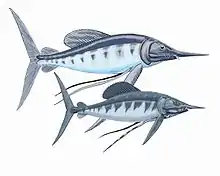
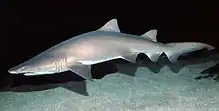


.jpg.webp)
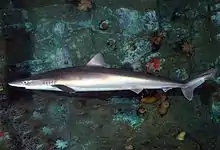
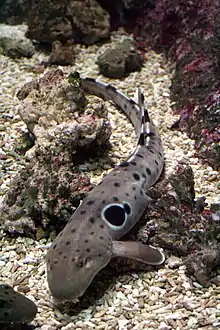



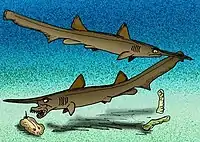
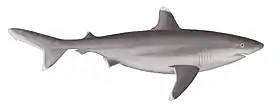



.jpg.webp)
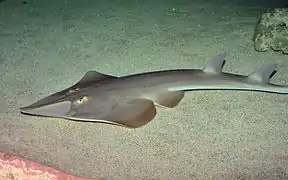


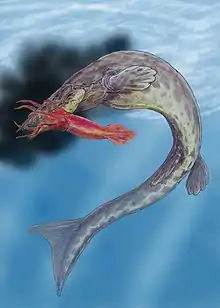


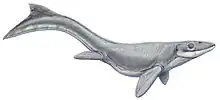



_-_National_Museum_of_Nature_and_Science%252C_Tokyo_-_DSC06778.JPG.webp)



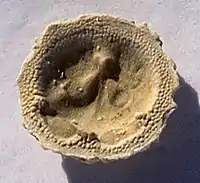


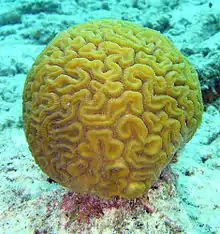

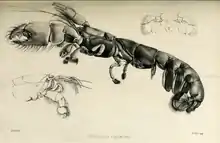


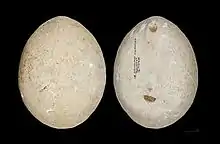

_Dos.jpg.webp)
